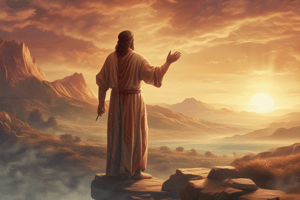Podcast
Questions and Answers
What is a common characteristic of the author’s background?
What is a common characteristic of the author’s background?
- A career in commercial literature
- A background in psychological research
- A connection to religious upbringing or scholarly study (correct)
- A focus on political science
Which aspect of the historical context does the narrative most directly reflect?
Which aspect of the historical context does the narrative most directly reflect?
- Technological advancements of the era
- Socio-political climate including oppression and persecution (correct)
- Economic prosperity during the timeframe
- Popularity of entertainment forms
What is a primary theme explored in the narratives about sacrifice?
What is a primary theme explored in the narratives about sacrifice?
- Financial success and its implications
- Relationships between sacrifice and redemption (correct)
- The aesthetic value of artistic expressions
- Adventure and exploration of new lands
How does the narrative structure often enhance the story?
How does the narrative structure often enhance the story?
What cultural aspect does the work most significantly contribute to?
What cultural aspect does the work most significantly contribute to?
What is a key element of character development in such narratives?
What is a key element of character development in such narratives?
Which symbol is commonly utilized to convey deeper meanings related to sacrifice and redemption?
Which symbol is commonly utilized to convey deeper meanings related to sacrifice and redemption?
What tone does the author typically adopt in their writing?
What tone does the author typically adopt in their writing?
Flashcards are hidden until you start studying
Study Notes
Author Biographies
- Author: The work is typically attributed to an author with a strong theological background or a literary figure known for exploring themes of sacrifice and redemption.
- Background: Often, the author may have a personal connection to the events or themes, either through religious upbringing or scholarly study.
- Influences: The author's writing may reflect various influences, including religious texts, personal experiences, and historical events that shaped their worldview.
Historical Context
- Time Period: The narrative often reflects the socio-political climate of the era, emphasizing issues like oppression, persecution, and moral dilemmas.
- Religious Climate: Explores the tension between different religious factions, the role of faith in society, and the historical significance of crucifixion as a form of punishment.
- Cultural Impact: The work is situated within a broader cultural movement that questions traditional beliefs and encourages critical examination of sacrificial narratives.
Themes Of Sacrifice
- Concept of Sacrifice: Explores various forms of sacrifice, including physical, emotional, and spiritual dimensions.
- Redemption: Examines how sacrifice leads to redemption for both the individual and the community.
- Duality of Suffering: Highlights the relationship between suffering and salvation, suggesting that suffering can lead to greater understanding and growth.
- Moral Choices: Questions the morality behind sacrifice, considering who benefits and who suffers as a result.
Literary Analysis
- Narrative Structure: Often employs a non-linear narrative, using flashbacks and multiple perspectives to deepen the exploration of themes.
- Symbolism: Utilizes symbols, such as the cross, blood, and light, to convey deeper meanings related to sacrifice and redemption.
- Character Development: Characters often experience significant transformations, facing moral dilemmas that test their values and beliefs.
- Tone and Style: The author may adopt a somber yet reflective tone, using lyrical language to evoke emotion and provoke thought.
Impact On Society
- Cultural Reflection: The work serves as a mirror to societal values and conflicts, prompting discussions about morality, faith, and human experience.
- Religious Discourse: Influences theological debates regarding the nature of sacrifice and its relevance in contemporary spiritual practices.
- Literary Influence: Inspires future writers and artists to explore similar themes, contributing to a body of work that examines the complexities of human existence.
- Social Movements: May catalyze movements for social justice, as the themes resonate with individuals seeking to address injustice and promote healing through sacrifice.
Author Biographies
- Work attributed to authors with theological backgrounds or literary figures focusing on sacrifice and redemption.
- Authors often have personal connections through religious upbringing or scholarly pursuits of relevant themes.
- Writing reflects influences from religious texts, personal experiences, and major historical events that shape their views.
Historical Context
- Narrative mirrors socio-political conditions of the era, highlighting oppression, persecution, and ethical dilemmas.
- Explores tensions among religious factions and examines faith's role in society, particularly the significance of crucifixion.
- Positioned within a cultural movement encouraging critical reflection on traditional beliefs and sacrificial narratives.
Themes Of Sacrifice
- Investigates diverse forms of sacrifice, encompassing physical, emotional, and spiritual aspects.
- Sacrifice is linked to redemption, impacting both individuals and communities.
- Emphasizes the connection between suffering and salvation, suggesting growth can arise from suffering.
- Questions the morality of sacrifice, analyzing the beneficiaries and those who endure loss.
Literary Analysis
- Narrative structure often features non-linear storytelling with flashbacks and multiple perspectives to enhance theme exploration.
- Symbolism plays a crucial role, with elements such as the cross, blood, and light representing deeper meanings of sacrifice and redemption.
- Characters undergo significant transformations, facing moral dilemmas that challenge their values and beliefs.
- The tone is typically somber yet reflective, utilizing lyrical language to evoke emotion and inspire contemplation.
Impact On Society
- Works reflect societal values and conflicts, stimulating discussions on morality, faith, and human existence.
- Influences theological debates on the essence of sacrifice and its pertinence in modern spiritual practices.
- Inspires future writers and artists to delve into similar themes, enriching a body of literature that explores human complexity.
- May serve as a catalyst for social justice movements, resonating with those addressing injustice and seeking healing through sacrifice.
Studying That Suits You
Use AI to generate personalized quizzes and flashcards to suit your learning preferences.




